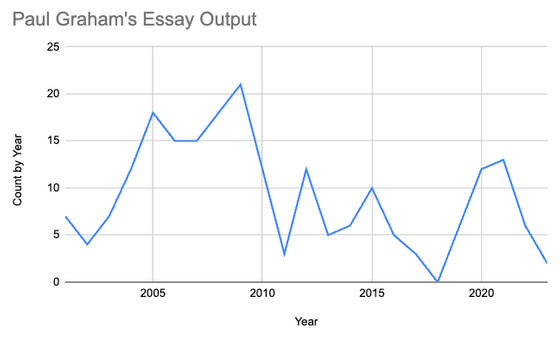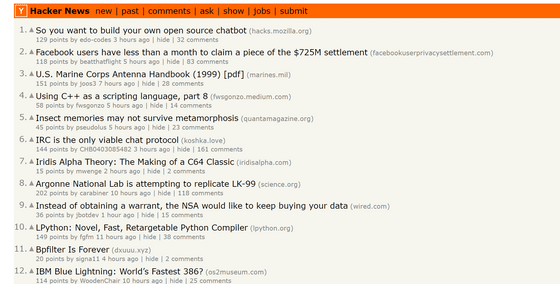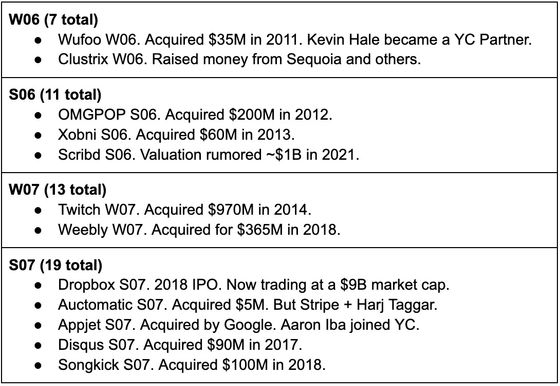The path to the birth of the startup accelerator `` Y Combinator '' that has created numerous unicorn companies, `` delivering small power to the right place '' is important

Founded the venture capital “Pillar VC” about how the startup accelerator “Y Combinator”, which produced famous companies such as OpenAI, Stripe, Airbnb, Instacart, Doordash, Dropbox, and Reddit, was born and grew. Analyzed by Tony Kelsa.
A relatively small amount of force applied at just the right place
Y Combinator was founded by Paul Graham , Robert T. Morris , Tolliver Blackwell , and Jessica Livingston with the specific theme of 'Even young, inexperienced people can create great startups.' . The first three had the experience of creating a company in graduate school and selling it to Yahoo! for $ 49 million (about 6.9 billion yen). Paul Graham came up with a generalized theory about ``why even young and inexperienced people can create great startups'' in the seven years after the company was sold, ``because the cost of starting a company has dropped significantly.'' .
There are three major cost reductions.
・Hardware cost
Computers and servers are now readily available.
・Advertising expenses
Free word-of-mouth promotion has become very effective thanks to the popularity of the Internet. Even if you don't spend advertising money, if you can create something that users like, word of mouth can dramatically increase your awareness for free.
・Personnel expenses
Advances in programming technology have made programmers much more productive, allowing them to build products with fewer employees. In his essay How to Start a Startup , Paul Graham said, 'I think hiring people is the worst thing a company can do.' Most of the cost of establishing a company is the labor cost paid to people to build the product, so if you do not hire people, it is possible to start a business with only the living expenses of the founding members.
In 2005, when Y Combinator was created, founders in their 20s with little experience were rarely treated seriously by venture capitalists (VCs), and people of student age were treated like students. I was. Y Combinator has created a space for these people.
'In a startup, growth is all that matters,' says Paul Graham in Startup = Growth . Regardless of 'what kind of person is the founder of a startup', 'where they work', 'who they are connected to', etc., grow 'something' at a rate of 5-7% per week is important. It probably takes just a few weeks to build something, publish it, and start growing.
Summarizing the above, the structure of the Y combinator is as follows.
Invest in young, smart, energetic and determined hackers
Give enough money to live on, but never more
Build something, publish it, and wait a few months to see evidence of growth
Good ideas are hard to come by, so we help a lot of startups in batch, or concurrently, to get statistics on our side.
Between 2001 and 2005, Paul Graham wrote 31 essays on life, programming and startups . It attracted attention on SNS such as Slashdot and hacker mailing lists, and in 2005, Paul Graham's lecture was so popular that the auditorium was full, exceeding the capacity of the standing room.
Alexis Ohanian, one of the founders of Reddit, describes his experience listening to the lecture in his book Without Their Permission .
The lecture room was packed and Paul spent about 45 minutes reading notes and answering questions politely. At one point, he described the perfect angel investor as 'people who have made themselves rich in technology.' As he said this, you must have noticed a roomful of ambitious founders all widening their eyes in hope. He abruptly clarified, 'Oh, it's not me!'
At the same time, the hum of 100 disappointed geeks filled the room…Graham will remember this moment as realizing that a little money can go a long way for the right founder.
Tony Kelsa said 'a whirlwind of 100 disappointed geeks at the same time' was the market's support for Y Combinator. In March 2005, Paul Graham announced Y Combinator, with the first batch in the summer of 2005. Among those who invested in the first batch were Reddit founder and current CEO Steve Huffman, Justin Kang, who later founded Twitch's predecessor, Justin.tv, and Sam Altman, who later founded OpenAI. That's what I'm talking about.
Paul Graham continued writing essays at a breakneck pace while running Y Combinator. People read your essays and comment on them on social media, mailing lists, etc. Y Combinator released ' Hacker News ' in February 2007 and figured out how to put those comments to good use.

Hacker News is a site that allows you to comment on various contents on the Internet, and the purpose was to identify future founders by the content of the comments. Some of the people who applied to Y Combinator were friends of people who had already invested in Y Combinator, and some people met in advance at startup events, but most of them had no prior information. There were times when it was difficult to make decisions. It is said that creating a community called Hacker News made it possible for Y Combinator to know about founder candidates before applying. Since the account shared with Hacker News is used to apply for Y Combinator, you can understand what kind of person you are by reading the content of the link and discussion posted on Hacker News by that account.

Y Combinator grew very quickly, helping about 60 companies in its first five batches. At least a few fast-growing startups emerged from each batch, and Y Combinator, along with the entire talent network around Y Combinator, grew exponentially. Many of the famous companies born from the Y combinator were born from friends and early employees of the founder of the Y combinator.
・Dropbox
Adam Smith, who founded Xobni in the S06 batch, was Drew Houston's 'Big Brother' to Drew Houston, who founded Dropbox, and invited Drew Houston to dinner at Y Combinator.
・Airbnb
Michael Seibel, CEO of Justin.tv, an adviser to Airbnb, suggested applying to Y Combinator. Brian Chesky, who founded Airbnb, once refused the offer because he had already started the business, but ultimately decided to apply due to lack of funds.
・Coinbase
Brian Armstrong, who founded Coinbase, was an early hire at Airbnb, designing a payment platform and fraud detection system.
Also, Y combinator sometimes supported the same founder many times.
・Kiko
Justin Kang and Emmett Shea created a web calendar app called Kiko in Y Combinator's S05 batch. Soon after, Google launched Google Calendar, and although Kiko itself had to withdraw, the two founders stayed at Y Combinator the following year and livestreamed discussions on startup strategy. I came up with the idea. This idea led to Justin.tv to keep Justin Kang's life constantly streaming, and Y Combinator backed them again. Even after Justin.tv was split into SocialCam and Twitch and sold for a total of $ 1.03 billion (about 145 billion yen), Justin Kang continued to launch many companies such as Exec, Atrium and Cruise.
Justin Kang and Emmett Shea hired Michael Seibel at Justin.tv, and Michael Seibel invited Airbnb to Y Combinator. And it is said that the network of human resources has been connected, such as Brian Armstrong, a graduate of Airbnb, establishing Coinbase.
・Actomatic→Stripe
In 2007, Patrick Collison and his brother John joined Y Combinator, merging with several companies to form Auctomatic, and 10 months after its founding, Auctomatic was sold to Live Current Media for $5 million. sold to And they said that they started working on the development of Stripe in 2009. Stripe did not pass the Y combinator program, but instead Paul Graham and Sam Altman invested $ 15,000 (about 2.1 million yen) in 2% of the company. Considering that they sold Auctomatic for $5 million (about 700 million yen), the investment money should have been unnecessary, so the Collison brothers felt great value in working with the Y Combinator team. is showing.
The idea put forward when Y Combinator was founded that even young, inexperienced people can build great startups is absolutely correct, and the results have been astonishing. But Y Combinator's success wasn't just about attracting people who were overlooked because they were young and inexperienced.
Paul Graham said, 'Optimism and ambition are the two big things that Y Combinator nurtures in startups. You have to do it well. Don't just say 'think big' and you'll do it. Don't make this work. Doing it systematically is a big part of the value of Y Combinator.”
How to cultivate optimism and ambition in practice can be found in Paul Graham's essay How to Do Great Work .
There will be a lot of people trying to do great work. It's a combination of humility and fear that holds them back. It seems presumptuous to try to be Newton or Shakespeare. It seems difficult. Surely you would fail if you tried to do something like that. Perhaps the calculation is rarely clear. Few people consciously decide not to do great work. But that's what happens subconsciously. they avoid questions.
So I'm going to give you a sneaky trick. Do you want to do great work or don't you? Now you have to make a conscious decision. sorry. I wouldn't do it to the general public. But we already know you are interested.
Don't worry about presumptuous things. No need to tell anyone. What if it's too difficult and you fail? Many people have more serious problems than that. In fact, good luck if it's the worst problem.
Yes, you have to work hard. But again, many have to work hard. And if you're working on something that you find very interesting, which it inevitably does if you're on the right track, perhaps the work feels more of a burden than many of your colleagues. I don't think so.
In this essay, Paul Graham explains why humility and fear shy away from big visions, because it's depressing to see your progress compared to your goals. , ``Focus on doing complex small things continuously'' is mentioned.
Great work comes from consistently focusing on something you truly care about. Stop and take a look and you'll be amazed at how far you've come.
The reason we are surprised is that we underestimate the cumulative effect of our work. Writing a page a day doesn't seem like much, but if you do it every day, you'll end up writing a book a year. That's the key, it's consistency. People who do great things don't get a lot done every day, but they don't do nothing, they do something.
If you do compound work, you get exponential growth.
Y Combinator's program is only 3 months long, and Demo Day requires a demo, so we need to build and launch something earlier than that day. Paul Graham's essay ' Startup = Growth ' states:
Y Combinator measures the growth rate from week to week. One of the reasons is because the time until Demo Day is so short, and also because early startups need frequent feedback from users to fine-tune what they're doing. There is also. A good growth rate in Y Combinator is 5-7% per week. If you can hit 10% a week, you are doing very well. If you only have 1%, it shows that you still don't understand what you're doing.
We usually advise startups to pick a growth rate they think they can achieve and try to hit that growth rate each week. The key word here is 'just'. If you decide to grow at 7% for a week and you hit that number, you've had a successful week. They don't need to do anything more. But if they fail to achieve it, they have failed the only thing that matters, and should be vigilant accordingly. Programmers will understand what we are doing here. We turn startup launch into an optimization problem.
In theory, this kind of hill-climbing can put startups in trouble. Eventually it may reach a local maximum. But in reality that never happens. You have to hit growth rates every week, so founders have to act, and action or inaction is the difference between success. Nine times out of ten, sitting down and strategizing is just a form of procrastination.
Y Combinator helps founders overcome humility and fear by forcing them to make conscious choices to do good work, and Y Combinator has the same There are environments where you can be surrounded by leaders who have achieved success in your position, and where you can compare yourself to your peers in the same batch using a unified metric of weekly growth rate.
Y Combinator not only had a number of successes in its first batch, but 12 out of 50 startups that were hired in batches 2-5 were successful. The hit rate was a staggering 24%.

Now, the number of startups invested by Y combinator has reached 4000, and the total investment amount has expanded to the equivalent of 600 billion dollars (about 85 trillion yen). Among these 4,000 cases are Airbnb, Stripe, Instacart, Coinbase, Doordash, Reddit, etc. Y Combinator handles 5 to 7% of those companies for about $ 20,000 (about 2.8 million yen) each. I put it in
It all started with four personal funds of $ 2 million (about 280 million yen), Paul Graham, Robert T. Morris, Toliver Blackwell, and Jessica Livingston. Y Combinator has been operating without external funding until 2009, showing how effective 'delivering a small force to the right place' can be.
Related Posts:
in Note, Posted by log1d_ts







